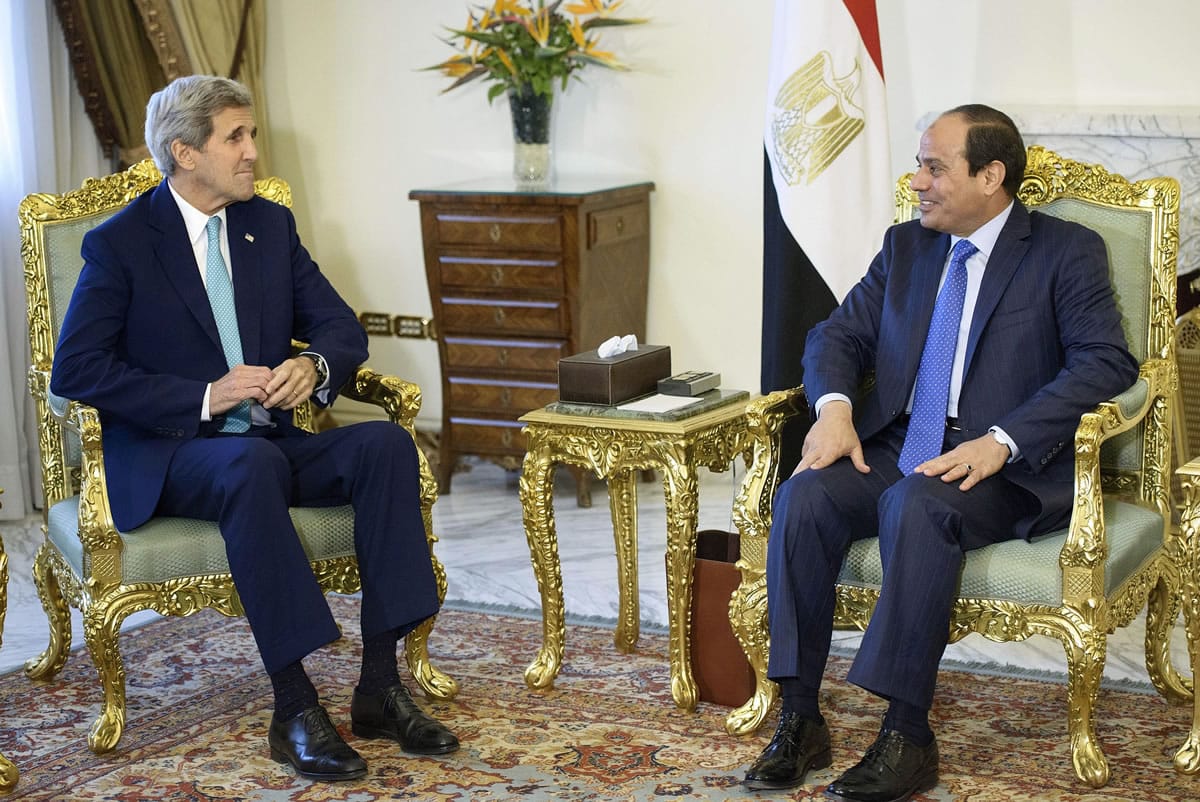CAIRO — Despite persistent human rights concerns, the United States on Sunday resumed formal security talks with Egypt that were last held six years ago amid the political unrest that swept the country in the wake of the Arab Spring.
Two days after the U.S. delivered eight F-16 warplanes to Egypt as part of a military support package that the Obama administration is boosting to help Egypt counter an increasing terrorist threat, Secretary of State John Kerry restarted the strategic dialogue with Egyptian officials in Cairo.
Kerry said the U.S. is committed to working with Egypt to enhance its military capabilities as it confronts growing threats from extremists, particularly in the Sinai Peninsula. That aid had been on hold until earlier this year due to human rights and democracy concerns in the wake of the military overthrow of Islamist President Mohammed Morsi in 2013.
Kerry was in Cairo on the first stop of a Mideast trip that is mainly aimed at assuaging Arab concerns over the nuclear deal between Iran and world powers. After meeting with Egyptian President Abdel-Fattah el-Sissi, he traveled to Qatar, where he will hold discussions with Gulf Arab foreign ministers on the Iran deal and its implications for the region.
Before meeting with el-Sissi, Kerry told Egyptian Foreign Minister Sameh Shoukry that the U.S. would “continue to provide robust training to the Egyptian military, as the military seeks it and desires it, in an effort to build capacity, and also to meet the highest expectations of your military for its professionalism.” He noted that in addition to the F-16s, the U.S. had provided Egypt with Apache helicopters, attack boats, armored vehicles and other weapons systems this year.
More aid is on the way, he said.
At the same time, he acknowledged stress in the U.S.-Egypt relationship over human rights and said Washington would continue to press Cairo on the arrests of dissidents and journalists, and mass trials.
“Obviously, there has been a little bit of tension over certain issues,” he told reporters at a joint news conference with Shoukry shortly after a court in Cairo again postponed a verdict in the trial of three Al-Jazeera English journalists, whose arrests on have sparked widespread condemnation.
Shoukry said no journalists have been detained in Egypt for doing their jobs, only for terrorism and other offenses, and he rejected criticism that detainees were being denied due process. He said Egypt is committed to improving its human rights conditions but noted that all countries, even mature democracies, have imperfect rights records.
Kerry made the case, though, that freedom of speech, assembly and peaceful political dissent must be allowed if Egypt is to successfully combat extremism, especially ahead of parliamentary elections later this year.
He added that fighting extremism requires more than military might and called on Egypt to adopt a broad strategy that would both improve the economy and accept dissent to prevent young people from embracing radical ideologies.
“Otherwise, no matter how many terrorists we bring to justice, those groups will replenish their ranks, and we will not be safer,” Kerry said.
Broadening U.S.-Egyptian trade and economic ties also was also on the table during Kerry’s visit, which comes just days before Egypt inaugurates a second, parallel waterway to allow two-way traffic on the Suez Canal. Egyptian officials said they hope the opening will boost a flagging economy. Kerry congratulated Egypt on the Suez project ahead of its opening Thursday, and he announced that U.S.-Egypt trade and investment consultations will resume in the fall.
On Iran, Kerry said in Doha he will make the case to members of the Gulf Cooperation Council that the Iran nuclear agreement will make the Middle East more secure. The Gulf Arab states have publicly welcomed the deal reached recently in Vienna, but many have expressed private reservations.



